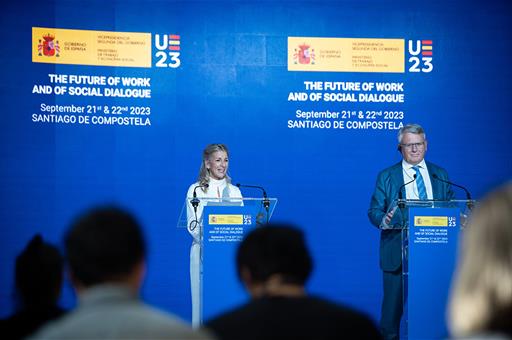Yolanda Díaz outlines the future European social agenda with social partners, European leaders and international institutions
News - 2023.9.21
"Our presidency of the EU is hosting this meeting in Santiago with the main European social actors to design a new agenda that takes us towards a social Europe", said the acting Deputy Prime Minister before opening a tripartite meeting with the European Commissioner for Jobs and Social Rights, Nicolas Schmit, the European labour ministers and Secretaries of State for employment, leaders of the European and Spanish social partners, as well as experts and representatives of international organisations such as the International Labour Organisation (ILO) and the Organisation for Economic Co-operation and Development (OECD), among others.
Defining the future European social agenda
With a view to the Commission that will emerge from next year's European elections, Díaz sees this meeting as a forum for reflection, debate and proposals to continue making progress in the protection of workers' rights. "This new agenda, the minister insisted, has to talk about democratising work, giving working people a leading role in ecological planning and putting algorithms and artificial intelligence at the service of people".
All of these issues will be discussed in depth during the debates on Friday, the ultimate aim of which is to promote public policies that contribute to a real improvement in the living and working conditions of citizens.
Díaz considered that during this legislature, steps have been taken that would have been unthinkable a few years ago with the approval of directives such as the gender pay transparency directive, the balanced presence of women on boards of directors or something unimaginable a few years ago: the minimum wage directive, which affects more than 25 million workers, many of them women.
A new social contract in Europe
The ministers present in Santiago, the social partners and international organisations will discuss how to move towards a new social contract in Europe.
"We must be able to provide security and answers to the problems and needs of the social majorities in our countries", explained the Deputy Prime Minister, who insisted that the key to continuing along this path lies in social dialogue. "We must make social dialogue a hallmark of the European Union," she stressed.
In her view, social dialogue is also crucial in shaping the future European agenda. In this regard, she stressed the importance of reaching transnational agreements such as the one that the European social partners are finalising on telework and digital disconnection. If successful, it would be the first such agreement at European level in 13 years.
The Deputy Prime Minister will propose to the participants in this meeting, one of the events of the Spanish presidency of the Council of the EU, that they explore instruments and initiatives to develop the European Union's Pillar of Social Rights, in order to move towards a more social Europe.
In her opinion, social convergence is essential if we want to regain the confidence of citizens in the European integration project. In this regard, she called for the EU's limited scope of competence in socio-labour matters to be widened. "It is time to rebuild Europe's institutional architecture to prioritise people's well-being," she said.
Díaz will also request the support of the ILO and international institutions to turn the European social model into a benchmark to be exported, so that other nations also set their sights on decent work with rights, the transition to equality and diversity policies and digitalisation at the service of people.
The Deputy Prime Minister is also scheduled to meet with the Secretary General of the European Trade Union Confederation ETUC, Esther Lynch, with whom she will discuss the issues at stake in this meeting, as well as other labour issues being negotiated in the European institutions, such as the directive on platform work.
Non official translation





